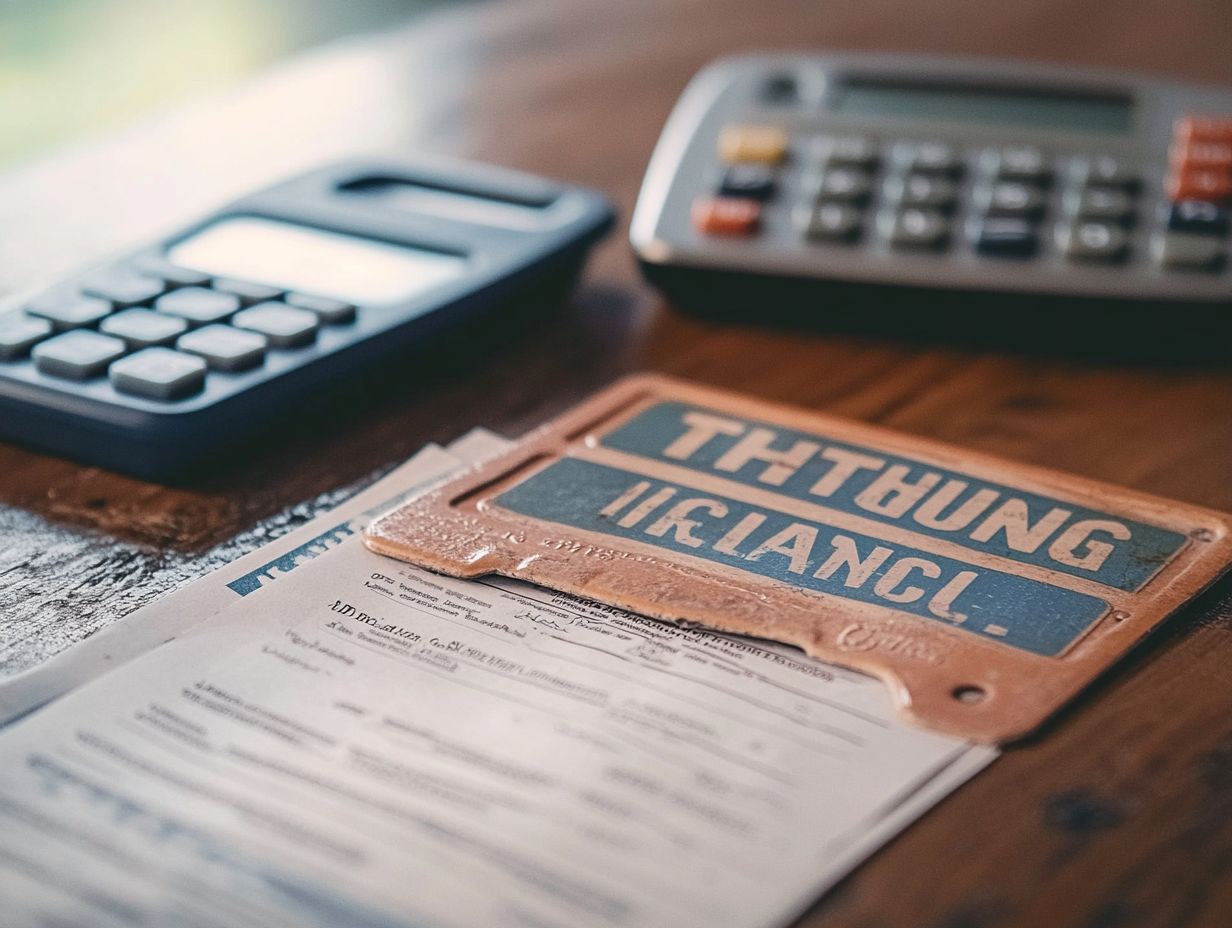What to Know About Tennessee Auto Insurance Laws
Navigating the world of auto insurance in Tennessee can feel overwhelming. However, understanding the laws and coverage options is essential for every driver.
This guide distills the key aspects of Tennessee auto insurance. It covers everything from minimum coverage requirements to the penalties for driving without insurance.
We will explore various types of insurance available, highlight the factors that influence rates, and provide valuable tips for discovering the policy that best suits your needs.
Whether you’re a seasoned driver or just starting out, this information empowers you to make informed decisions about your auto insurance.
Contents
- Key Takeaways:
- Overview of Tennessee Auto Insurance Laws
- Types of Auto Insurance Available in Tennessee
- Factors That Affect Auto Insurance Rates in Tennessee
- Tips for Finding the Best Auto Insurance in Tennessee
- Frequently Asked Questions
- What are the minimum auto insurance requirements in Tennessee?
- Do I need uninsured/underinsured motorist coverage in Tennessee?
- What happens if I don’t have auto insurance in Tennessee?
- Can my insurance company cancel my policy without notice?
- Do I need to have proof of insurance in my vehicle at all times?
- What should I do if I am involved in an accident in Tennessee?
Key Takeaways:

- Tennessee requires all drivers to have minimum auto insurance coverage to legally operate a vehicle.
- Driving without insurance can result in penalties and fines, including potential suspension of your driver’s license and vehicle registration.
- Factors such as driving record, age, gender, and location can affect auto insurance rates, making it important to shop around for the best coverage.
Overview of Tennessee Auto Insurance Laws
Tennessee’s auto insurance laws are shaped by state regulations and mandates aimed at protecting drivers and injury victims while promoting financial responsibility.
Key figures like Governor Bill Haslam and legislative authorities such as William Lamberth have played vital roles in shaping these laws. They include essential elements like minimum coverage requirements and penalties for not complying, which are crucial for ensuring road safety and accountability among motorists.
Minimum Coverage Requirements
In Tennessee, you must maintain a basic level of liability insurance, which includes bodily injury and property damage coverage, to comply with the law requiring insurance. This law protects others on the road and shields you from significant financial losses in case of an accident.
The mandatory coverage amounts are:
- $25,000 for bodily injury per person,
- $50,000 for bodily injury per accident, and
- $15,000 for property damage.
Consider getting uninsured motorist coverage. This helps mitigate risks associated with uninsured drivers, who are unfortunately common on Tennessee roads. By adhering to these legal requirements, you fulfill your responsibilities while effectively protecting your interests against unforeseen circumstances.
Penalties for Driving Without Insurance
Driving without insurance in Tennessee is a serious breach of the law requiring insurance, and it carries hefty penalties. You might face fines, have your license suspended, or see your insurance rates increase.
If you’re caught driving uninsured, prepare for legal repercussions. This could include court appearances or more severe penalties if you’re a repeat offender. The state often conducts an insurance verification process that can trigger immediate penalties if you can’t prove your coverage during a traffic stop or an accident.
This situation not only harms your driving record but also tends to raise your insurance premiums over time. Therefore, maintaining the right insurance is crucial; failing to do so can lead to a cycle of fines and escalating rates that linger long after the initial incident.
Types of Auto Insurance Available in Tennessee
Explore a wide range of auto insurance options designed to protect you from the risks of driving. This includes essential liability insurance, uninsured/underinsured motorist coverage, collision coverage, and comprehensive coverage.
Each of these options plays a crucial role in safeguarding not just you as the driver, but also your passengers and your vehicle, ensuring you re well-prepared for whatever the road may bring.
Take the first step today check your coverage, and ensure you’re protected on Tennessee roads!
Liability Insurance

Liability insurance in Tennessee is essential for auto insurance. It offers protection for bodily injury and property damage you might cause to others in an accident.
Tennessee law requires drivers to carry minimum coverage limits for money protection. This policy safeguards victims from unpaid medical bills or property repairs. It also acts as a vital backup for you as a driver.
You must have enough liability protection to stay safe! It shields you from potentially devastating out-of-pocket expenses from third-party claims. Falling short on coverage can lead to significant money issues, legal troubles, and even losing your driving privileges. Understanding and meeting liability requirements protects both yourself and others on the road.
Uninsured/Underinsured Motorist Coverage
Uninsured and underinsured motorist coverage in Tennessee is a crucial backup. It shields you from the money fallout of accidents caused by negligent individuals who lack adequate insurance.
These coverages significantly impact your situation in a collision where the responsible party is uninsured or underinsured. Uninsured motorist coverage steps in when the at-fault driver has no insurance, while underinsured motorist coverage activates if their insurance doesn’t fully cover your losses.
Grasping these distinctions is invaluable during tough times. It helps you evaluate potential claim amounts and recovery compensation for medical expenses, lost wages, and property damage costs that can escalate based on the severity of the accident.
Collision Coverage
Collision coverage in Tennessee is essential for your car insurance. It covers damages to your vehicle from a collision, whether it s with another vehicle or an object, regardless of fault.
This insurance reimburses you for repair or replacement costs up to your vehicle’s actual cash value (the amount your car is worth today after depreciation), minus any deductible in your policy. Costs can change significantly, influenced by factors such as your car’s make and model, your driving history, and your chosen deductible.
Opting for collision coverage is wise if you want to reduce money issues after an accident. If you collide with a guardrail or are in a multi-car pileup, collision coverage eases the financial burden of repair costs. It ensures you aren t faced with a hefty bill that disrupts your financial stability.
Comprehensive Coverage
Comprehensive coverage in Tennessee provides vital protection against non-collision incidents like theft, vandalism, and natural disasters. It ensures you won t face financial strain from unexpected damages to your vehicle.
This insurance covers various scenarios standard collision coverage might miss. For example, if a tree crashes onto your parked car during a storm or hail damages your vehicle, comprehensive coverage steps in to handle the costs. It beautifully complements liability and collision coverage, enhancing your overall protection strategy.
You ll notice the impact of this coverage when registering your vehicle. Having comprehensive insurance can lead to different premium rates, providing you with greater peace of mind as a policyholder.
Factors That Affect Auto Insurance Rates in Tennessee
In Tennessee, various factors shape auto insurance rates. Your driving history, age, gender, and location all play pivotal roles in determining your final premium.
Understanding these elements gives you the power to make informed decisions about your coverage.
Driving Record

Your driving history can have a considerable impact on your auto insurance rates in Tennessee. Insurers often penalize those with less-than-stellar records by charging higher premiums.
This is particularly true if you’ve had serious infractions like DUIs (Driving Under the Influence), reckless driving, or multiple speeding tickets. A poor driving record is often seen as a red flag, indicating a greater likelihood of future claims.
Your premiums could rise significantly due to such violations, which impacts both your current rates and long-term insurability. Even minor incidents, like running a red light, can add up over time, leading to a persistent financial burden.
To keep your future insurance costs in check, it s crucial to maintain a clean driving record.
Age and Gender
In Tennessee, both age and gender play vital roles in the risk assessment process that insurance carriers use to set auto insurance rates. As a younger driver or a male driver, you might face higher premiums due to the statistical reality of increased risk.
This risk assessment is based on a wealth of population information that insurers carefully scrutinize to predict the likelihood of claims. For example, statistics show that drivers aged 16 to 24 are involved in a remarkably high number of accidents, resulting in premiums that can be 20% to 30% higher than those for older drivers.
Similarly, studies indicate that male drivers, especially those in their late teens and early twenties, engage in riskier driving behaviors compared to their female counterparts. This prompts insurers to impose increased rates.
This complex model enables insurers to customize their policies more effectively, but it can also lead to greater financial burdens for certain groups.
Location
Location plays a significant role in determining your auto insurance rates in Tennessee. Urban areas often face higher rates compared to rural regions, largely due to increased risk factors like heavier traffic and higher accident rates.
This disparity stems from multiple elements, one of which is population density. In bustling cities like Memphis and Nashville, the surge of vehicles on the road naturally leads to a greater potential for collisions.
Urban settings also grapple with complex traffic patterns and frequent stop-and-go conditions, heightening the chances of accidents. In contrast, rural areas typically enjoy less congestion and fewer traffic incidents, making for more favorable insurance premiums.
Insurance companies are keen observers of these local dynamics. They conduct thorough risk assessments, weighing everything from crime rates to environmental conditions, ensuring that coverage options are tailored effectively for each location.
Tips for Finding the Best Auto Insurance in Tennessee
Finding the best auto insurance in Tennessee requires a strategic approach to comparison shopping. You should leverage a variety of insurance options and keenly identify discounts that can substantially lower your premiums, all while ensuring you have adequate coverage.
Comparison Shopping
Comparison shopping for auto insurance in Tennessee is pivotal for securing the best coverage at competitive rates. This allows you to assess various options and tailor your coverage to meet specific needs.
To effectively navigate the insurance marketplace, begin by gathering multiple quotes from a variety of providers. You can either visit the websites of different insurance companies or leverage online comparison tools that compile an array of offers for you.
As you review these quotes, remember to look beyond the price tag. It’s essential to evaluate the level of coverage each policy offers, along with any deductibles and limits that might impact your claims.
Understanding your coverage requirements such as liability, collision, and comprehensive insurance can significantly affect your overall rates. This knowledge gives you the power to choose a policy that not only aligns with your budget but also provides robust protection for your assets in the unfortunate event of an accident.
Don t wait too long to compare and find your best option! The right auto insurance can save you money for fun activities or needs, making it worth your while to start your search today.
Discounts and Savings Opportunities

Tennessee drivers can unlock a variety of discounts and savings offered by insurance carriers. Options include accident forgiveness and roadside assistance programs, which can significantly reduce insurance premiums.
Many insurers offer discounts for maintaining a safe driving record, completing defensive driving courses, and bundling multiple policies like auto and home insurance. Act fast to qualify for these perks showcase a clean driving history or participate in recognized safety programs. For instance, enrolling in a defensive driving course might save you up to 10% on your premiums.
Don’t miss out ask your insurance provider about potential savings. Each carrier may have unique offerings that can lead to considerable financial benefits over time.
Frequently Asked Questions
What are the minimum auto insurance requirements in Tennessee?
In Tennessee, all drivers must have liability coverage of at least $25,000 for bodily injury per person, $50,000 for bodily injury per accident, and $15,000 for property damage.
Do I need uninsured/underinsured motorist coverage in Tennessee?
While it is not required by law, it is highly recommended to have uninsured/underinsured motorist coverage in case you are involved in an accident with a driver who does not have enough coverage or no insurance at all.
What happens if I don’t have auto insurance in Tennessee?
If you are caught driving without insurance in Tennessee, you could face fines, suspension of your driver’s license and registration, and even possible jail time.
Can my insurance company cancel my policy without notice?
Yes, in Tennessee, insurance companies can cancel your policy if you fail to pay your premiums, provide false information, or have your driver’s license suspended or revoked.
Do I need to have proof of insurance in my vehicle at all times?
Yes, Tennessee requires all drivers to carry proof of insurance in their vehicle at all times. This can be in the form of a physical insurance card or a digital copy on your phone.
What should I do if I am involved in an accident in Tennessee?
If you are involved in an accident, exchange insurance information with the other driver and file a report with the police. You should also contact your insurance company as soon as possible to report the accident.

